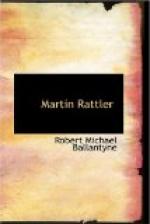To this sternly delivered speech the Baron made no reply, but, springing suddenly upon Martin, he grasped him in his powerful arms and crushed him to his broad breast till he almost broke every bone in his body.
“Och! cushla, bliss yer young face! sure it’s yersilf, an’ no mistake! Kape still, Martin dear. Let me look at ye, darlint! Ah! then, isn’t it my heart that’s been broken for months an’ months past about ye?”
Reader, it would be utterly in vain for me to attempt to describe either the words that flowed from the lips of Martin Rattler and Barney O’Flannagan on this happy occasion, or the feelings that filled their swelling hearts. The speechless amazement of Martin, the ejaculatory exclamations of the Baron Fagoni, the rapid questions and brief replies, are all totally indescribable. Suffice it to say that for full quarter of an hour they exclaimed, shouted, and danced round each other, without coming to any satisfactory knowledge of how each had got to the same place, except that Barney at last discovered that Martin had travelled there by chance, and he had reached the mines by “intuition.” Having settled this point, they sobered down a little.
“Now, Martin darlint,” cried the Irishman, throwing aside his hat for the first time, and displaying his well-known jolly visage, of which the forehead, eyes, and nose alone survived the general inundation of red hair, “ye’ll be hungry, I’ve small doubt, so sit ye down, lad, to supper, and you’ll tell me yer story as ye go along, and afther that I’ll tell ye mine, while I smoke my pipe,—the ould cutty, boy, that has corned through fire and wather, sound as a bell and blacker than iver!”
The Baron held up the well-known instrument of fumigation, as he spoke, in triumph.
Supper was superb. There were venison steaks, armadillo cutlets, tapir hash, iguana pie, and an immense variety of fruits and vegetables, that would have served a dozen men, besides cakes and splendid coffee.
“You live well here, Barney—I beg pardon—Baron Fagoni,” said Martin, during a pause in their meal; “how in the world did you come by that name?”
Barney winked expressively. “Ah, boy, I wish I may niver have a worse. Ye see, when I first corned here, about four months ago, I found that the mine was owned by an Irish gintleman; an’, like all the race, he’s a trump. He took to me at wance when he hear’d my voice, and then he took more to me when he corned to know me character; and says he to me wan day, ‘Barney,’ says he, ‘I’m gittin’ tired o’ this kind o’ life now, and if ye’ll agree to stop here as overseer, and sind me the proceeds o’ the mine to Rio Janeiro, a great city on the sea-coast, an’ the capital o’ Brazil, I’ll give ye a good share o’ the profits. But,’ says he, ’ye’ll need to pretind ye’re a Roosian, or a Pole, or somethin’ o’ that kind; for the fellows in thim parts are great rascals, and there’s a few Englishmen among them who




